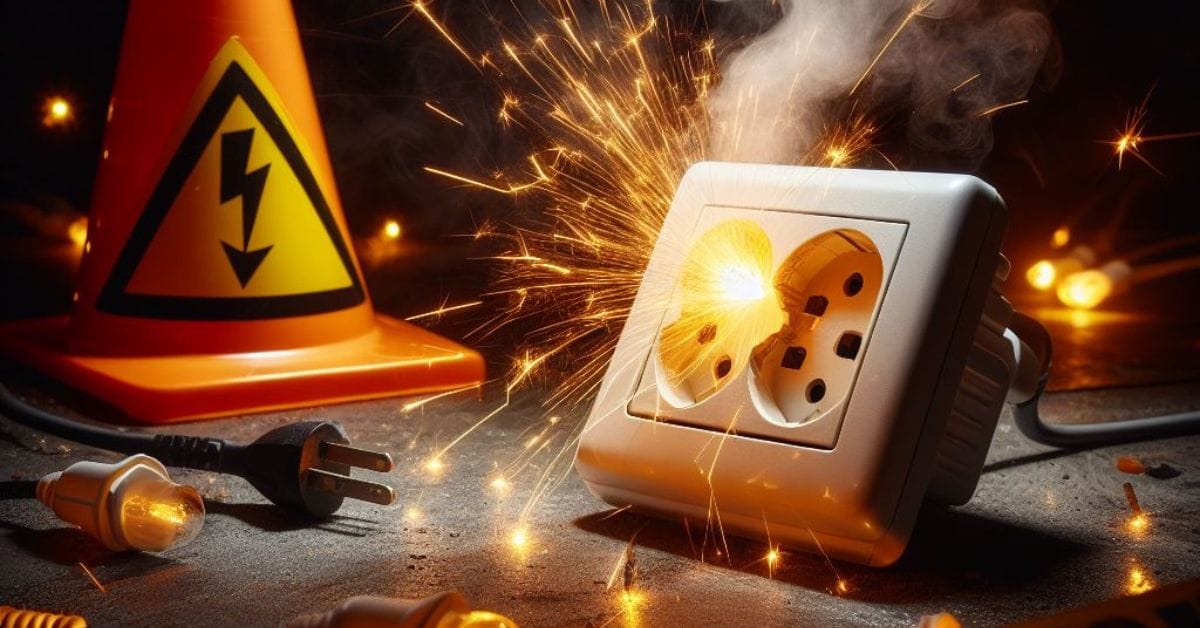How Long Does the Electrical Burning Smell Last? (Guide)

Have you ever walked into a room and been hit with that sharp, unmistakable scent of electrical burning? It’s enough to raise anyone’s eyebrows and get the heart racing.
I’ve been there, and I know it can be alarming. But how long should that smell linger before it’s time to worry?
An electrical burning smell in your home should not last more than a few hours. If it persists, it indicates a serious issue. Immediate action includes cutting power, assessing the area, and calling a professional. Regular checks can prevent such hazards.
So, buckle up, and let’s get ready to tackle this together. By the end of this article, you’ll be equipped with the knowledge to identify an electrical burning smell and handle it like a pro, ensuring your home stays safe and sound. Let’s roll!
Understanding Electrical Burning Smells: Duration and Implications

Walking into a room where that faint whiff of burning hits you, you instantly know something’s not right. But how long is too long for this smell to hang around?
First off, understanding the duration of an electrical burning smell is key. It could be minor if it’s fleeting – just a few minutes, and then it’s gone.
Maybe a dust bunny ended its journey on your lamp’s bulb. But if that smoky scent lingers for over a few hours, it’s time to turn detective.
Stay safe, stay alert, and keep those sniffer skills sharp. If that burnt smell is hanging around like last year’s fruitcake, don’t hesitate to call in the pros. Your home and your peace of mind are worth it.
Recognizing the Electrical Burning Smell: Key Characteristics
Let’s break down those telltale signs of an electrical burning smell. We’re not talking about burnt popcorn here, but a unique, sharp odor, like burning plastic or rubber – something that screams “attention needed” in your home.
First up, keep an eye out for smoking or melting electrical components – they’re pretty obvious signs. But also look for less obvious clues, like yellowing or browning outlets. These subtle hints are often missed, but they’re key indicators of electrical trouble.
It can get tricky to distinguish this smell from other household odors. Have you ever wondered, “Is that my phone charger, or did I leave something on the stove?” The real clue is persistence. If the smell sticks around after unplugging your gadgets, that’s your big red flag.
And hey, don’t just rely on your nose. Listen for any unusual sounds, like buzzing or crackling – that’s not a sound you want in your home. Flickering lights can also be a giveaway. It’s like your house is trying to send you a signal.
Remember, catching these signs early is key. It’s all about keeping your home safe and sound.
Causes of Electrical Burning Smells in Homes

Let’s zero in on those sneaky causes of electrical burning smells in your home. These are the things you want to watch out for:
- Overloaded Circuits: Picture an overstuffed suitcase, but it’s your electrical system. Too many gadgets plugged in? That’s asking for trouble. Overheating wires and melting insulation can send that burning smell to your nose.
- Faulty Wiring: This one’s tricky because it’s hidden behind your walls. Old or damaged wires? They’re prime candidates for causing that electrical fire scent. And that’s not a guest you want in your home.
- Appliances Gone Rogue: Your everyday appliances can turn against you if not in top shape. Keep an eye on those frayed cords and faulty motors. They’re not just messing up your toast; they could be the source of that acrid smell.
- Light Fixture Mishaps: Using the wrong bulb wattage might seem small, but it’s a big deal. It’s like starting a mini-marathon for that burning smell. Always match your bulb’s wattage with what your fixture can handle.
- Suspicious Outlets and Switches: Notice discoloration or heat from your outlets and switches. That’s your cue to check the wiring.
Remember, these burning smells are your home’s way of sending an SOS. Regular checks and smart electricity use can keep your place safe and smelling just right. Keep your eyes open and always respect the power of electricity!
Immediate Steps to Take When You Detect an Electrical Burning Smell
When you catch that eerie scent of electrical burning, don’t just stand there wondering where it’s coming from. Your safety could be on the line, and you must act fast.
Never ignore a potential electrical hazard; instead, jump into action and follow these steps to nip the danger in the bud.
- Step 1: Cut the Power – Head straight to the source. Flip off that appliance switch or dash to the circuit breaker. Cutting the current is your first line of defense.
- Step 2: Quick Assessment – Take a rapid look around. Can you spot the problem appliance or outlet? Unplug it right away. If you can’t find the source or the smell lingers, it’s time for professional help.
- Step 3: Call an Electrician – You hand it to the pros. Electrical issues can be complex, and you want someone who knows their stuff to handle it.
- Step 4: Safety Measures – Keep a fire extinguisher close, and if things seem risky, don’t hesitate to evacuate the area. Safety comes first, always.
- Step 5: No Power Until Clear – Don’t flip that power back on until your electrician gives you the green light. Better to be safe than sorry.
Remember, regular home check-ups for any electrical misfits are key. Stay sharp and keep your home safe!
Dealing With Persistent Electrical Burning Odors: Remedies and Solutions
When you’re up against an electrical burning smell that won’t quit, it’s like having an unwelcome house guest overstaying their welcome. My advice? Don’t just live with it – tackle it head-on.
- Cut the Power First: Start by shutting off the power to the suspected area. It’s a crucial step to prevent any further issues and prioritize safety.

- Ventilate Naturally: Open those windows and let the fans run. Fresh air is often the best way to start clearing that stubborn smell.

- Use Air Purifiers or Charcoal Filters: Bring in air purifiers or activated charcoal filters if the smell sticks around. These aren’t just cover-ups; they absorb and neutralize the odor.

- Try DIY Odor Absorbers: Place bowls of white vinegar or a mix of baking soda and water near the affected area for a home remedy. It’s amazing how a little kitchen wizardry can help.

- Call in the Professionals: If the smell persists, it’s time to call a certified electrician. They can spot problems that you might miss.

Remember, regular electrical check-ups can prevent these issues. Stay proactive to keep your home safe and smelling fresh.
Essential Tips for Electrical Safety in Your Home
I’m excited to share some essential tips on preventing electrical issues in your home. Trust me, I’ve seen my fair share of electrical mishaps, and the key to avoiding them is a combination of regular maintenance and smart practices.
Preventative Measures for Electrical Safety
- Regular Home Electrical System Inspections: A professional must inspect your home’s electrical system at least once every two years. This can help identify hazards like outdated wiring or overloaded circuits before they become serious issues. I’ve seen firsthand how these inspections can be lifesavers, literally.
- Safe Usage of Electrical Appliances: Overloading outlets is a common mistake that can lead to electrical problems. Spread out your appliances and use surge protectors to avoid this. Additionally, routinely check the cords of your appliances. If they show any sign of wear or damage, it’s time for a replacement. I’ve learned that watching these little details can prevent big problems.
- Dealing with Older Homes: Be extra cautious in an older home. The wiring in these homes may not be suited to the demands of modern appliances. Signs like flickering lights when using appliances are your cue to get a professional evaluation of your wiring.
Maintenance Tips for Electrical Health
- Proper Electrical Maintenance: Keep your electrical outlets and switches clean to prevent dust accumulation, which can lead to overheating. If you’re a DIY enthusiast, remember that some electrical tasks are better left to professionals. Missteps in DIY electrical work can lead to serious hazards.
- Being Vigilant with Extension Cords: Extension cords should be a temporary solution, not a permanent fixture. Avoid running them under carpets or across doorways to prevent tripping hazards and potential fire risks. I’ve tripped over a poorly placed extension cord and learned the importance of proper cord management the hard way!
Adhering to these preventative measures and maintenance tips can significantly reduce the risk of electrical problems in your home. Stay vigilant and proactive about electrical safety!
Frequently Asked Questions
- Is an Electrical Burning Smell Toxic?
- When electrical components like PVC burn, they release toxic substances like carbon monoxide, carbon dioxide, hydrogen chloride, dioxins, and chlorinated furans. Even small amounts can be harmful. Exposure to 100 parts per million of these fumes for 30 minutes is dangerous; 300 parts per million can be deadly. Always take an electrical burning smell seriously.
- Are Power Strips A Safer Option Than Extension Cords?
- Power strips are generally safer than extension cords because they often come with built-in surge protectors. However, they should still be used wisely. Don’t overload them; ensure they’re rated for the devices you’re plugging in. Remember, even power strips aren’t a substitute for permanent wiring solutions.
- How Often Should Electrical Wiring Be Checked In A Home?
- I recommend having your home’s electrical system professionally inspected every two to four years. You might want to do it more frequently if you’re in an older home or have significantly changed your electrical usage (like adding more appliances).
- How Can I Tell If My Home’s Wiring Is Outdated?
- Suppose your house is over 20 years old and hasn’t had an electrical upgrade. Other telltale signs include a lack of ground fault circuit interrupter (GFCI) outlets in bathrooms and kitchens, rubber-coated wiring, and a shortage of outlets, leading to excessive use of extension cords.
- Is It Safe To Do Basic Electrical Repairs Myself?
- It depends on your skill level and the complexity of the task. Simple tasks like replacing a light switch or outlet can be done by yourself if you have some basic understanding and take proper safety precautions. However, calling a professional for more complex issues like wiring repairs is always safer.
- Can Dimmer Switches Cause Electrical Problems?
- Dimmer switches can cause problems if they’re not properly matched to the lighting load they control or if they’re incorrectly installed. Make sure your dimmer switches are compatible with the type of bulbs you’re using (like LED or halogen) and are installed by a qualified electrician.
References
Organizations:
- Electrical Safety Foundation International (ESFI). https://www.esfi.org/
- National Electrical Manufacturers Association (NEMA). https://www.nema.org/
- Institute of Electrical and Electronics Engineers (IEEE). https://www.ieee.org/
Books:
- “Wiring a House” by Rex Cauldwell. https://www.barnesandnoble.com/w/wiring-a-house-rex-cauldwell/1118175264
- “Black & Decker The Complete Guide to Wiring” https://www.barnesandnoble.com/w/black-decker-the-complete-guide-to-wiring-updated-8th-edition-cool-springs-press/1141325337
- “Electrical Safety Handbook” by John Cadick, Mary Capelli-Schellpfeffer, et al. https://www.barnesandnoble.com/w/electrical-safety-handbook-4th-edition-mary-capelli-schellpfeffer/1127944053
Website Resources:
- Electrical Safety First. http://electricalsafetyfirst.org.uk/
- U.S. Consumer Product Safety Commission. http://cpsc.gov/
